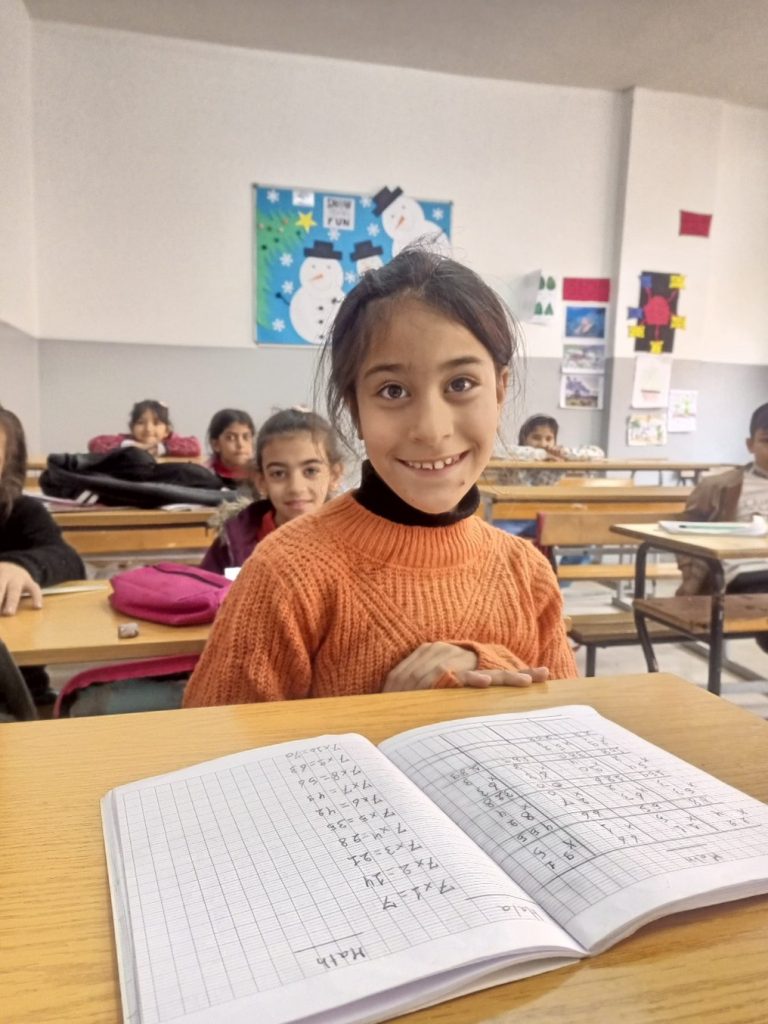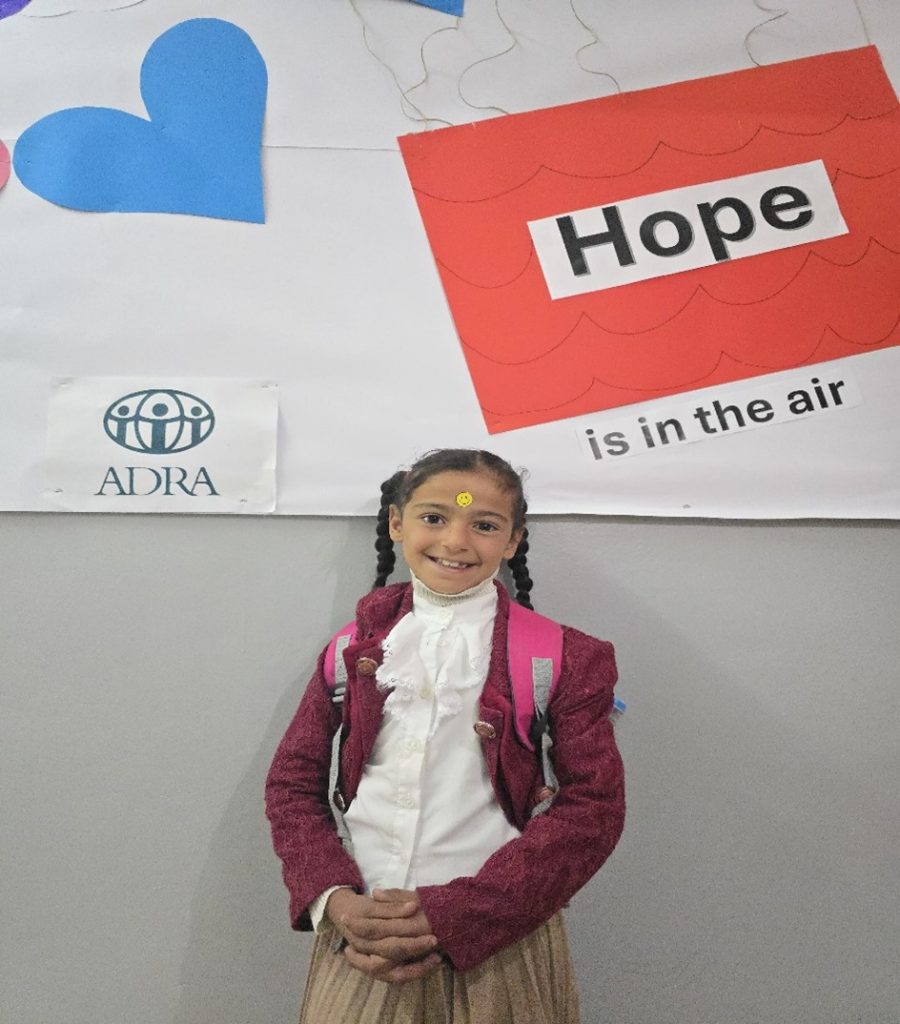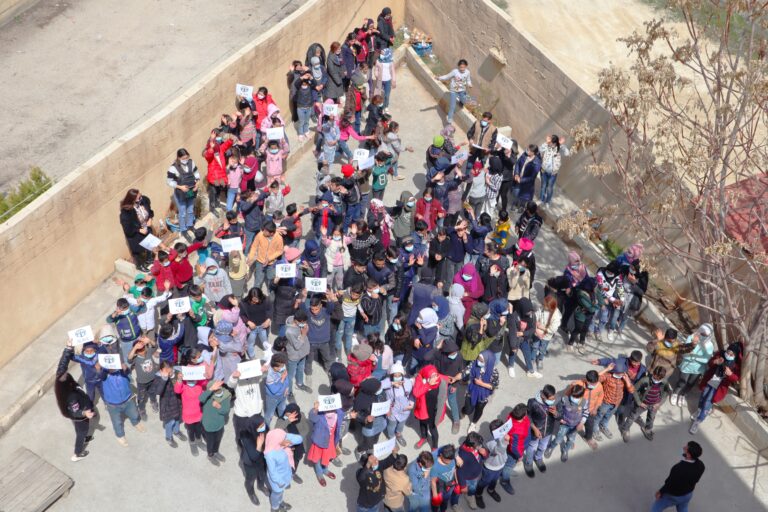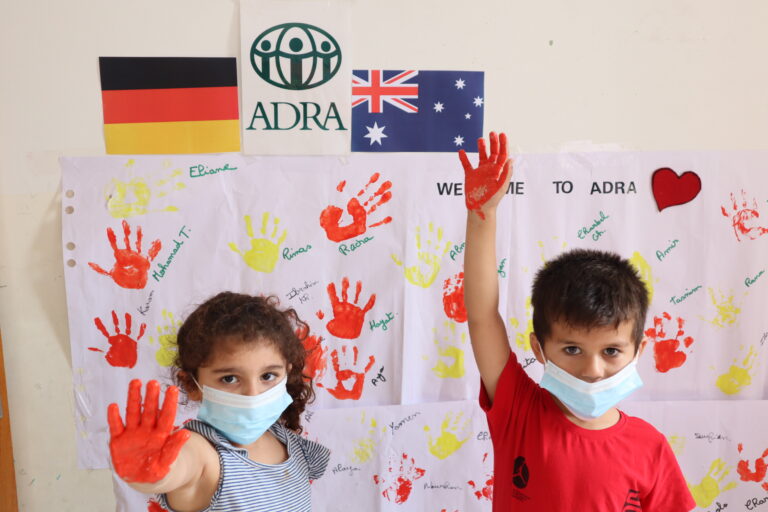Education
education is everything
1.2 million children in Lebanon have been out of school.
Over the past COVID-19 year, Lebanese children have received an estimated maximum of 11 weeks of education and 55% of Lebanese families are now living in poverty. The learning crisis was further compounded by a currency collapse, and the Beirut port explosion and COVID-19 lockdown measures.
- Project Highlights:
In response to the ongoing public school crisis, including a recent strike (teachers’ strikes are common from time to time in Lebanon because of low salaries and collapsed systems)[1], we implemented an intensified educational program to mitigate learning gaps. This included supplementary worksheets aligned with the Lebanese curriculum and focused instruction. To foster holistic development, we integrated recreational activities (both indoor and outdoor) to enhance students’ well-being, promote balance, and build self-esteem, thereby addressing potential anxiety and depression. Additionally, 420 students in Baalbek and BML received essential stationery kits and daily snacks.
To ensure educational sustainability, 200 students within our project were enrolled into official syste, and will finally receive diplomas upon successful completion of the curriculum and examinations. This initiative aims to reinforce their skills and motivation for continued learning. Furthermore, 420 students participate in life skills sessions covering children’s rights to education and effective communication. Parents received psychosocial support (PSS) sessions addressing violence, bullying, alternative care, and hygiene. A parent meeting was held, during which they expressed appreciation for the teachers’ dedication.
Adaptation to the Evolving Context in Baalbek
To address the trauma resulting from the conflict, we implemented intensive psychosocial support sessions. Our Retention Support Program (RSP), encompassing Early Childhood Education (ECE) and Basic Literacy and Numeracy (BLN), provided 420 children in Baalbek and Beirut (both Syrian and Lebanese) with critical educational resources, including transportation, daily snacks, and stationery.
Beyond academics, we extended non-educational support, including awareness sessions on child rights and protection, vision aid, and therapies for learning difficulties.
During the project, we observed notable changes within the groups of people we are working with, particularly regarding their level of vulnerability. Many of our students initially worked to support their families, which disrupted their education. However, after we provided transportation and stationery, we noticed a significant increase in their attendance at both public schools and our learning center. Meetings with their parents revealed that our interventions had alleviated some of the burdens associated with the costs of transportation and educational materials. As a result, these children were able to focus more on their education and pursue their studies without the added pressure of contributing financially. This positive change underscores the importance of our support in enabling vulnerable families to prioritize their children’s education, ultimately enhancing their overall well-being and opportunities for the future.
Security:
Political instability
The war that occurred in September 2024 significantly impacted the students in Baalbek, as many were affected by bombings in the area and were forced to leave the city until a ceasefire in December 2024. During this time, schools, particularly those catering to Syrian refugees, were closed and did not reopen until January 7, 2025. As a result, students missed a crucial part of the curriculum, which affected their educational development.
In response to this situation, ADRA Lebanon took proactive measures to support the affected students. Our teachers began covering the material missed during the school closures for all ADRA students, ensuring they had access to essential learning resources aligned with the official Lebanese curriculum. We also implemented a homework distribution system to help students continue their learning during the disruptions. By staying closely attuned to the political and social landscape, ADRA workers remained prepared to respond effectively, ensuring that students could regain their educational momentum despite the challenges posed by the conflict.
“We are resuming educational activities at the ADRA community center, with a focus on addressing learning gaps and restoring a sense of hope among students.”
The Challenge
ADRA's Response
Ramadan Mubarak! Wishing you a warm and joyful start to this blessed month — Ramadan Kareem
The comparison between the Arabic letters ح (Ḥaa’) and ج (Jeem) is very important for BLN students, as it helps them clearly distinguish between two similar-looking letters that have different sounds, meanings, and uses in Arabic.
Since Spelling Bee🐝 competition improves the students’ spelling skills,helps them to learn new words and builds self confidence , students at ADRA Baalbeck Center participated in a spelling Bee contest ,they felt proud for having the courage to share and for the hard work they put into preparing .
Seventh-grade students separated soil and gravel from iron using magnetic sorting during chemistry class. They also separated water from soil using filtration technique
Mother’s love has always been a sustaining force for her family ,and one of the greatest joy is seeing her integrity, her compassion and her intelligence that are reflected in her children . ” Students at ADRA Baalbeck Center express their Love to their mothers by making cards and flowers in addition to singing and dancing to appreciate the unconditional love and the sacrifices she makes for her children .
Every child is a different kind of flower ,and all together they make this world a beautiful garden .Students at ADRA Baalbeck Center celebrated the Children’s Day which is a day of fun and games . They played together ,had fun ,laughed together and felt happy.
Teaching and Learning About Letters in Early Literacy Letter learning is nuanced, complex, and essential to the development of an effective literacy processing system.
2- Progress of Work Summary and Achievements
The project has enrolled the following students:
In Baalbek, Lebanon:
Grade | School | Location | Total # of children per grade morning | Total # of children per grade afternoon |
Remarks | |
Grade 1 | Formal Education | Baalbek | 50 |
| Grade 1 Two Classes | |
Grade 2 | Formal Education | Baalbek | 25 |
| – | |
Grade 3 | Formal Education | Baalbek | 25 |
| – | |
Grade 4 | Formal Education | Baalbek | 25 |
| – | |
Grade 5 | Formal Education | Baalbek |
25 |
|
– | |
Grade 6 | Formal Education +RSP | Baalbek |
25 |
19 | Grade 6 morning shift formal, Afternoon RSP | |
Grade 3 | Formal Education +RSP | Baalbek | 25 | 19 | Grade 3 morning shift formal, Afternoon RSP | |
Grade 7 | RSP | Baalbek |
| 19 |
| |
Grade8 | RSP | Baalbek |
| 18 |
| |
ECE | Formal Education | Baalbek |
| 65 |
| |
BLN | – | Baalbek |
| 25 |
| |
|
| Total # of Children | 200 | 165 |
| |
Grade1, 2 and 4 | RSP | BML | 95 |
| G1:30 G2:35 G4:30 | |
|
|
|
|
|
| |
3- Successes
Parent feedback indicates strong satisfaction with the program, highlighting the acquisition of valuable skills and knowledge by their children. Students demonstrate increased self-reliance in completing supplementary materials, which contributes to enhanced self-confidence through the reinforcement of classroom concepts.
Psychosocial support (PSS) sessions have proven effective in mitigating interpersonal conflict among students and providing crucial support to both students and parents in processing and recovering from war-related trauma.
4- Challenges:
- psychosocial Trauma:
- Exposure to conflict generates significant psychosocial trauma, impacting students’ ability to concentrate and engage in learning. This necessitates robust psychosocial support (PSS) interventions.
- The prevalence of anxiety, depression, and other mental health conditions among students requires specialized support systems within educational frameworks.
- Economic Hardship:
- The economic repercussions of conflict exacerbate existing poverty, leading to increased financial barriers to education. These barriers include:
- Inability to afford school fees, transportation, and essential learning materials.
- Increased pressure on children to engage in income-generating activities, resulting in school dropout.
- Food insecurity, which has a direct negative impact on the ability for children to learn.
- The economic repercussions of conflict exacerbate existing poverty, leading to increased financial barriers to education. These barriers include:
- Disrupted Educational Continuity:
- Conflict-related displacement and school closures cause significant disruptions to students’ education, leading to learning gaps and academic setbacks.
- The destruction or damage of educational infrastructure further compounds these disruptions.
- The inconsistency of educational access creates large gaps in the students learning.
- Increased Vulnerability of Marginalized Groups:
- Refugee children and children with disabilities face heightened vulnerability in post-conflict environments, requiring targeted interventions to ensure equitable access to education.
- The lack of proper documentation, especially for refugee children, is a huge hinderance to education access.
- Strain on Educational Resources:
- The influx of displaced populations and the increased need for educational support place a significant strain on existing educational resources.
- Teacher shortages, inadequate facilities, and limited funding pose challenges to providing quality education.
Addressing these challenges requires a comprehensive and coordinated approach involving:
- Provision of psychosocial support services.
- Rehabilitation of educational infrastructure.
- Targeted interventions for marginalized groups.
- Strengthening of educational capacity.
- Careful attention to the mental health of educators as well.
By acknowledging and addressing these challenges, ADRA team ensured that vulnerable students in Baalbek and Beirut have access to quality education and the opportunity to rebuild their lives.
4- A human-interest story: Sham’s Story: A Journey of Hope and Resilience
Sham Jihad Al-Debs is an eight -year-old third-grade student living in Baalbek with her grandmother, two sisters, and two brothers. Her father is a daily worker, while her mother has been in the Netherlands for over a year and a half, striving to build a better future for her children after the hardships of war.
Sham is cared for by her grandmother, but she deeply misses her mother. “I just want to see her and tell her everything,” Sham says with a hopeful smile.
Sham and her six-year-old brother Ali, who is in first grade, were recently enrolled in ADRA Baalbek Centre. Ali struggles with a speech difficulty but he dreams of becoming a soldier. “I’m waiting for my mom to send me a plane so I can go see her,” he says earnestly.
After registering at ADRA Baalbek Centre, the teachers recognized that Sham and Ali needed more than just academic support, they needed emotional care and encouragement. The teachers offered both psychological and educational support.
With this guidance, Sham is flourishing. She now dares to dream big; she wants to become a doctor one day. Thanks to the support of ADRA and the unwavering hope in her heart, Sham is one step closer to that dream.

Tahani’s Journey toward a Brighter future
Tahani Sabr Al-Mohammad is a bright and determined 6-year-old girl in grade one. She is the eldest of four siblings. Her father, a daily worker, and a janitor of the building where the family lives, struggles to provide for them. With no fixed monthly income and back pain that caused by an accidental gunshot injury, he was unable to enroll Tahani in either a public or private school. Despite these challenges, Tahani’s path took a hopeful turn when she enrolled in ADRA Baalbek centre in Baalbek. First, her academic level was assessed. The results showed that she needed support in both written and oral communication. Recognizing her potential, her teachers developed a learning plan for her, offering supplementary sheets in Arabic, English, math, and science. Tahani responded with enthusiasm and resilience. Her recent exam results reflect her important progress and growing confidence. Beyond academics, she has a vibrant personality and a deep affection for her teachers, often engaging in cheerful conversations that reflect her warmth and eagerness to learn.
Tahani dreams of becoming a doctor she loves learning and she determines to overcome obstacles. With ADRA team’s support, she is on her way to turn her dream into reality.

Did you Know?
The longer children in Lebanon are out of school, the higher the possibility that they will experience violence and exploitation, including child labor and child marriage.
IMPACT
300 Students Assisted
Around 300 students are assisted by ADRA for the last eight months. 200 for Early childhood education and around 100 for homework and retention support.
More than 150 caregivers were assisted with awareness sessions and provided with referrals needed.


